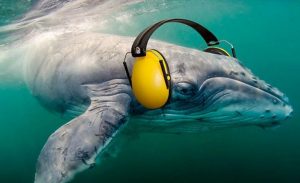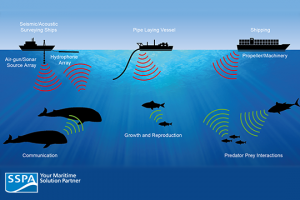Can you imagine how panic a dolphin is when she finds her “whistles” cannot be received completely by her fellows. Actually, sounds are very important to marine mammals because they use sound to communicate, navigate, and detect predators. However, various human activities, including fishing, shipping, habitat destruction and scientific research, make marine animals face threats. The human-generated noise could cause marine mammals to change their behavior, prevent them from hearing underwater sound, and being in danger of stranding.

Source: WHALECOASTALREVIEW.ORG
The following sections show evidences of 3 main effects that have been discovered in scientific researches.
- Behavioral Changes
Human-generated noise can alter some marine species’ behavior. A study on the effects of air-gun noise on the behavior of marine fish and squid was made in 2012. The results indicated that the fish in this research responded to increased noise by moving to the bottom of the water and swimming faster in more closely assembled groups, and it was observed in both the fish and squid that their alarm responses showed significant increases.
Marine mammals can be more vulnerable to predation if they are distracted by human-generated sounds. For example, Caribbean hermit crabs (Coenobita clypeatus) were distracted and allowed a predator to approach closer before they hid in response to boat motor noise.
-
Acoustic Masking
Acoustic masking occurs when noise interferes with an animal’s ability to perceive a sound. A related study was done in the Adriatic Sea in Italy, investigating the effects of ship noise on three classic vocal fish families with different hearing abilities. The results showed that the noise reduced the auditory sensitivity of these fish families since their hearing thresholds were almost completely masked.

A visual representation of human-generated noise interference with marine animals. Source: SSPA
-
Strandings
A Stranded animal is any live marine animal that is about to die outside of its survival places and is unable to return to its habitat. To some extent, human activities contribute to mass strandings of marine animals.
In particular, the human-generated noise relates to strandings of certain types of sea turtles and dolphins. Their strandings were recorded on beaches in Mexico when explosives occurred for removing oil platforms in offshore waters through this research. Similarly, another study found that following by military sonar exercises, the strandings of three beaked whale families often occurred.
This video may help you to understand how marine mammals live around the “smog” of sound.
From the reviews of studies, human-generated sound could become noise which may affect marine mammals’ life functions and even cause them die, linking to their survivals and reproduction. It is hoped that noise made by humans could be minimized to ensure marine species’ normal life and a stable ecology system.
– Xinwei Kuang


